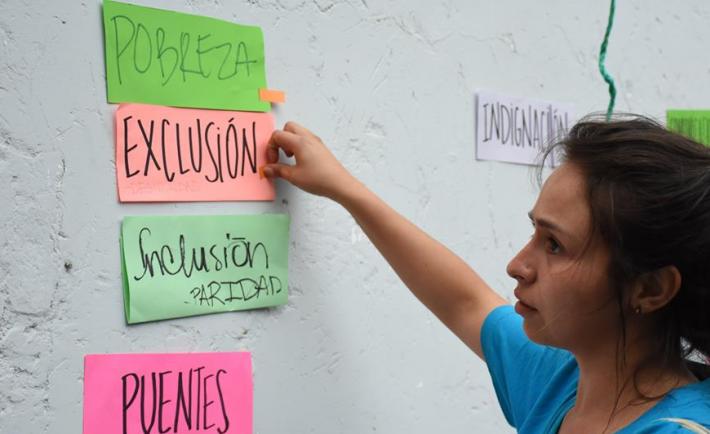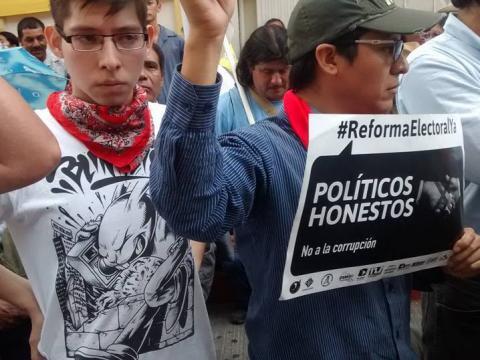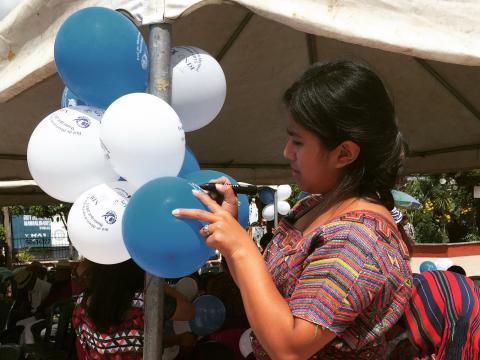
A young Guatemalan woman participates in an activity organized by civil society to reflect on the political crisis and future priorities. Credit: Pamela Saravia
As this blog series has highlighted, the 2015 Guatemalan elections were unique in many regards. Citizen protests resulted in the resignation and arrest of the president and vice president on corruption charges. Voter turnout was the highest since the return to democracy in Guatemala. The presumptive winner, the runner-up in elections four years earlier who was leading in the polls, failed to make it to the second round. And electoral violence was lower than expected and lower than during recent electoral processes. The question then becomes, what’s next for Guatemala?
NDI recently spoke with Carlos Sarti, the Director of the Propaz Foundation and a Mirador Electoral member, about what this context means for future elections, as well as for the immediate future in Guatemala.
Carlos is hopeful, but he also cautioned that underlying challenges will probably re-emerge. “The fact that the protests [in 2015] were peaceful likely encouraged non-violent responses in other spaces,” Carlos said. “However, the 2019 elections will be conducted in a different political environment, one more like those prior to 2015. Local conflicts have not been resolved and those conflicts will re-emerge during the period between elections, contributing to unrest and violence around elections like we have seen in the past.”
Citizens were focused on the political crisis and public protests in 2015 so other challenges were temporarily sidelined. This atypical environment, along with intense public scrutiny through domestic election observation, likely contributed to less violence. Involving citizens in political and civic life and keeping them engaged between elections not only strengthens citizen observation networks for future elections but also helps reduce violence. Engaged and informed citizens are better able to respond to the root causes of violence.
“It is extremely important to have citizen participation between elections so that they can understand trends and therefore better understand the context during the elections. When citizens understand the triggers of violence they will be better able to mitigate it at the local level.” - Carlos Sarti, the Director of the Propaz Foundation
Throughout the election process the Propaz Foundation analyzed information on incidents of political coercion, intimidation and violence to determine whether particular groups were disproportionately affected. It also coordinated with Collective Association for the Defense of Women's Rights in Guatemala (CODEFEM) and National Network of Mayan Youth (RENO’J) to monitor electoral violence against indigenous communities and women in two municipalities.
Carlos noted that while the high level of citizen participation during elections was positive, there needs to be greater involvement in the lead up to the 2019 elections. “When there is just election observation, there is lack of understanding of what happened beforehand,” Carlos said. “It is extremely important to have citizen participation between elections so that they can understand trends and therefore better understand the context during the elections. When citizens understand the triggers of violence they will be better able to mitigate it at the local level.”
The Guatemalan government is beginning to take action following last year’s protest in an effort to improve transparency and combat corruption. The Guatemalan Attorney General’s Office (Ministerio Publico) and the United Nations-backed International Commission Against Impunity in Guatemala (CICIG), which were responsible for uncovering the corruption scheme that prompted the protests, have indicated that they will expand their work outside of the capital.
In addition, the newly passed Law on Elections and Political Parties (LEPP) includes provisions allowing legal action to be taken against individuals who break campaign laws. Previously, only parties could be sanctioned and the fines were nominal. Now parties, members and candidates can be sanctioned up to US$250,000. These legal changes and improved oversight by government bodies promises to result in greater accountability, but citizens will need to continue to play the role of watchdog for the reforms to have teeth. Miguel Ángel Gálvez, the judge presiding over hearings on the alleged corruption of former President Otto Pérez Molina highlighted this point in recent comments. “It is essential that civil society be involved in government oversight. This is an opportunity that we must seize,” he said.
The stories in this series reflect the experiences of individuals and organizations that contributed to government and public oversight, and continue to work toward greater accountability in government. Each of the people highlighted in these stories, as well as the thousands of other members of the Mirador Electoral observation networks, believe deeply in the importance of doing their part to contribute to a more transparent and democratic society.
While their individual actions may feel like just “one grain of sand,” each action builds on the next and contributes to a nation-wide movement of democratic change. It is through the sum of their individual actions they are able to effect long-term progress. And this change starts with the brave Guatemalans who are breaking a history of intimidation and silence to hold their government officials responsible.




